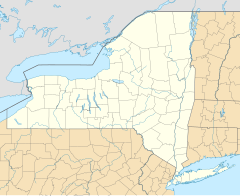Ambrose Light
|
Ambrose light station, rebuilt in 1999. This light station was dismantled in 2008.
|
|
| Location | Lower New York Bay; Ambrose Channel |
|---|---|
| Coordinates | 40°27′00″N 73°48′00″W / 40.45000°N 73.80000°WCoordinates: 40°27′00″N 73°48′00″W / 40.45000°N 73.80000°W |
| Year first lit |
1823 (Ambrose Lightship), 1967 (Texas Tower) 1999 (New Tower) |
| Automated | 1988 |
| Deactivated |
1999 (Texas Tower), 2008 (New Tower) |
| Foundation | Steel piles |
| Construction | Steel |
| Tower shape | Tower on red square worded AMBROSE |
| Height | 76 feet (23 m) |
| Intensity | 60,000 candles |
| Range | 18 nautical miles (33 km; 21 mi) |
| Characteristic | Flashing White 5 seconds |
| Fog signal | Horn 2 every 15s |
| Racon | "N" (−∘) |
1823 (Ambrose Lightship), 1967 (Texas Tower)
1999 (Texas Tower),
Ambrose Light, often called Ambrose Tower, was the light station at the convergence of several major shipping lanes in Lower New York Bay, including Ambrose Channel, the primary passage for ships entering and departing the Port of New York and New Jersey.
The tower, which was owned and maintained by the United States Coast Guard, was located at 40°28′N 73°50′W / 40.46°N 73.83°W.
On July 25, 2008, the Coast Guard announced that Ambrose Light, which was severely damaged when a tanker struck it on November 3, 2007, would be dismantled.
The removal work was done by Costello Dismantling Co. in September 2008. The tugboats Sea Wolf, Sea Bear and Miss Yvette assisted. The Coast Guard has replaced the light with flashing buoys.
Various lightships held this station from 1823 until its replacement in 1967. The original was only the fourth lightship designed and commissioned to serve a U.S. coastal port. The first Lightship Ambrose is now a museum in New York City.
The original light station was put into operation on August 23, 1967, replacing the obsolete Lightship Ambrose, and cost $2.4 million. The tower design was a Texas Tower, a very strong steel pipe structure based on the oil platforms built for use in the Gulf of Mexico. The structure was prefabricated in Norfolk, Virginia and shipped in sections on barges for assembly on-site. The tower station was situated about 7.5 miles (12.1 km) off of the coast of Sandy Hook, New Jersey in approximately 70 feet (21 m) of water and was supported by four 42-inch (1,100 mm) steel pipes, sunk down about 245 feet (75 m) to the bedrock. The light was about 136 feet (41 m) above mean low water and the 10,000,000 candle-power light could be seen for 18 miles (29 km).
...
Wikipedia

